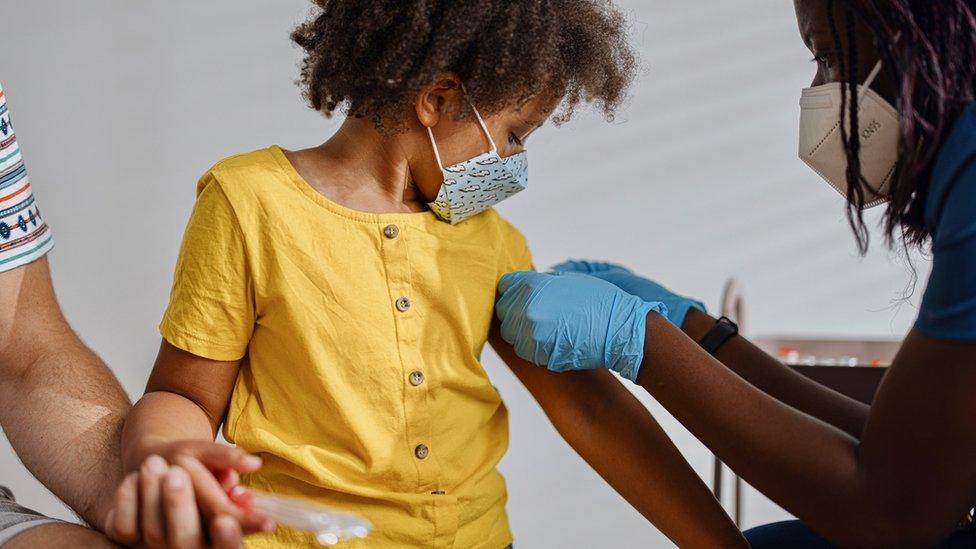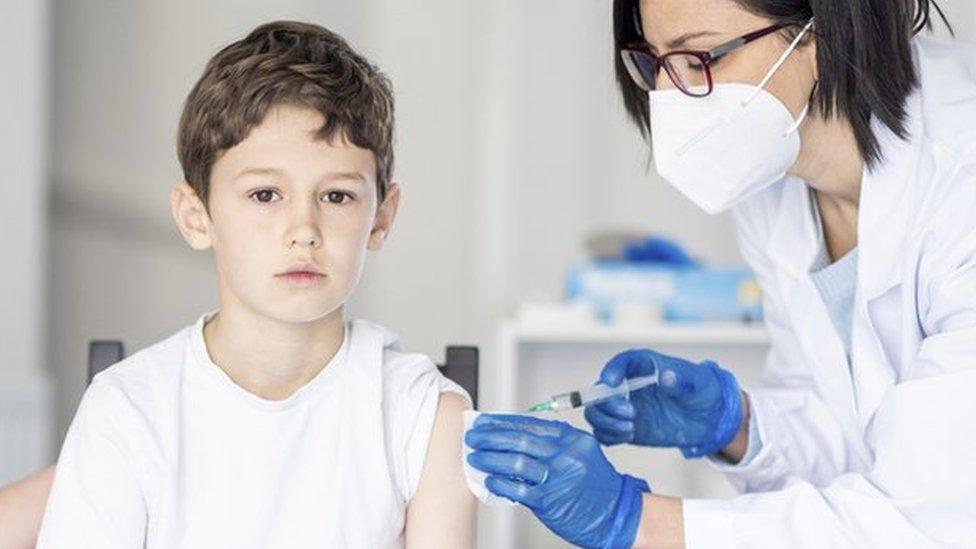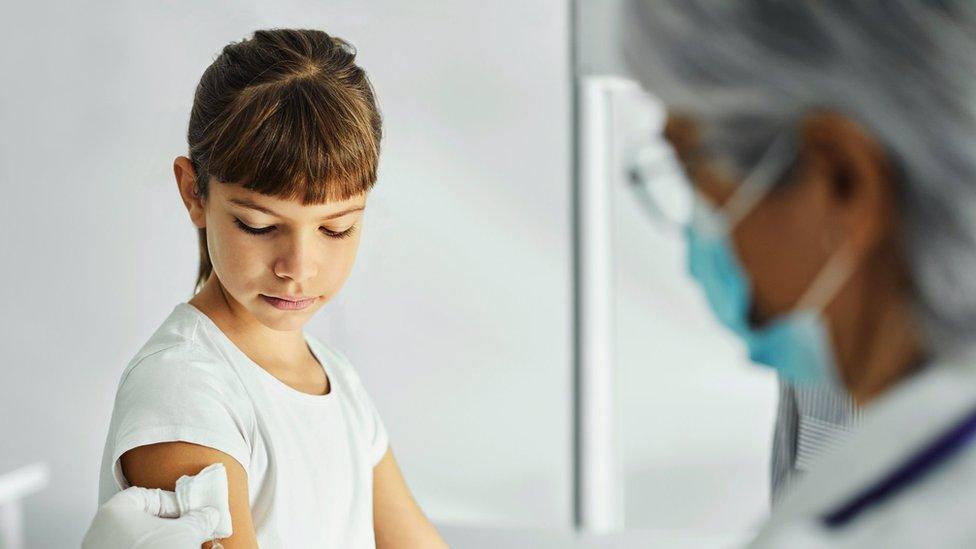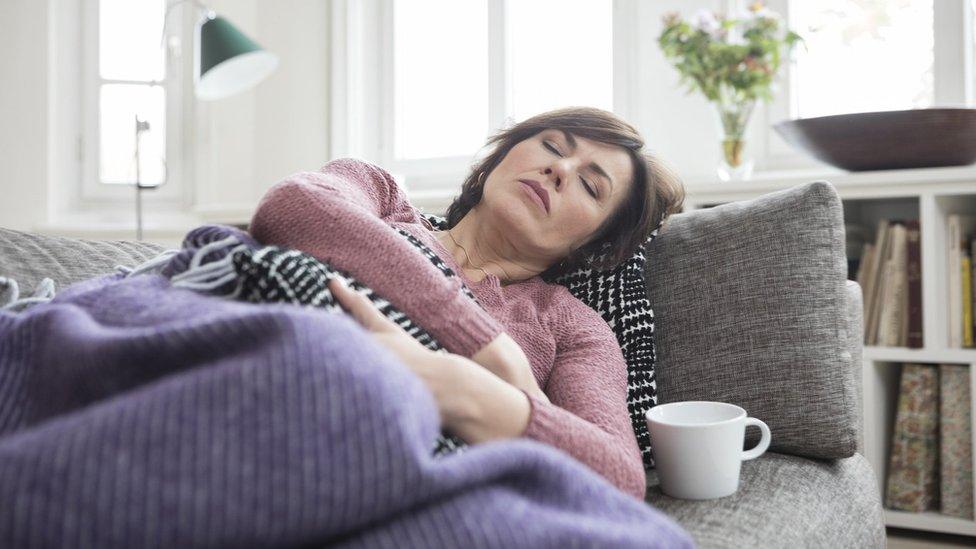England to offer Covid jab to five to 11-year-olds
- Published

Children aged between five and 11 in England will be offered a low-dose Covid vaccine, the government says.
Official scientific advice concludes the move would help protect the "very small" number of children who become seriously ill with Covid.
Health Secretary Sajid Javid says the rollout will be "non-urgent", with an emphasis on parental choice.
Northern Ireland also said on Wednesday it will be following Wales and Scotland in offering young children the vaccine.
Children are at a much lower risk of becoming severely ill from a Covid infection, so the health benefits of vaccinating them are smaller than in other age-groups. Also, many will have some protection from already having caught the virus.
So the scientists on the Joint Committee on Vaccination and Immunisation (JCVI), which advises governments across the UK, have been weighing up the evidence for immunising five to 11-year-olds.
It concluded vaccination should go ahead to prevent a "very small number of children from serious illness and hospitalisation" in a future wave of Covid.
Prof Wei Shen Lim, from the JCVI, said: "We're offering this to five to 11-year-olds now in order to future-proof their defences against a future wave of infection."
He suggested parents consider getting their children vaccinated during school holidays to minimise disruption to their education from any flu-like side effects of the jab.
The full guidance, external says fewer than two children would develop inflamed heart muscle (myocarditis) out of every million vaccinated.
However, it estimates vaccinating one million children would prevent:
98 hospitalisations if the next wave was more severe like previous variants
17 hospitalisations if the next wave was relatively mild, like Omicron
Prof Lim warned other childhood vaccinations include the MMR and HPV campaigns have "fallen behind due to the pandemic" and it was "vital" that Covid jabs did not disrupt these immunisations.
Mr Javid said: "The NHS will prepare to extend this non-urgent offer to all children during April so parents can, if they want, take up the offer to increase protection against potential future waves of Covid-19 as we learn to live with this virus."
He emphasised that children are at low risk from Covid and that the "priority remains for the NHS to offer vaccines and boosters to adults and vulnerable young people" and to catch-up with other childhood immunisation programmes".
The vaccine - which contains just a third of the adult dose - has already been used widely in other countries. The US alone has given it to eight million children in this age group.
However, the JCVI denied it had been slow to act and said the vaccine had received regulatory approval only in December.
Children aged from five to 11 who have other medical conditions that put them at greater risk are already eligible for the vaccine.
In total, about six million children in the UK in that age group will be offered the jab.
Two 10 microgram doses of the Pfizer/BioNTech vaccine, with at least 12 weeks between each dose, would be administered to those whose parents decide to take up the offer.
The Welsh government announced on Tuesday that it would be offering jabs to children after seeing the JCVI ruling.
It followed reports the committee's announcement was delayed due to a disagreement with the UK government, which says it is "reviewing the JCVI's advice as part of wider decision-making".
Scotland then followed the next day, with First Minister Nicola Sturgeon saying Scottish ministers had received and considered the same JCVI advice and were "content to accept it".
She told parents and carers of children in the five to 11 age group that more information would be given when plans had been finalised.
Labour's shadow education secretary Bridget Phillipson said the JCVI decision was "important and welcome news" but accused the government of treating children as "an afterthought" during the pandemic.
"Ministers must now ensure all children can access the jab to avoid further disruption to their education," she said.


If you are a parent, do you plan to have your child vaccinated? What are your questions about children receiving a Covid vaccine? Send us your questions and tell us about your plans by emailing: haveyoursay@bbc.co.uk, external.
Please include a contact number if you are willing to speak to a BBC journalist. You can also get in touch in the following ways:
WhatsApp: +44 7756 165803, external
Tweet: @BBC_HaveYourSay, external
Or fill out the form below
Please read our terms & conditions and privacy policy
If you are reading this page and can't see the form you will need to visit the mobile version of the BBC website to submit your question or comment or you can email us at HaveYourSay@bbc.co.uk, external. Please include your name, age and location with any submission.


Related topics
- Published16 February 2022

- Published15 February 2022

- Published15 February 2022
